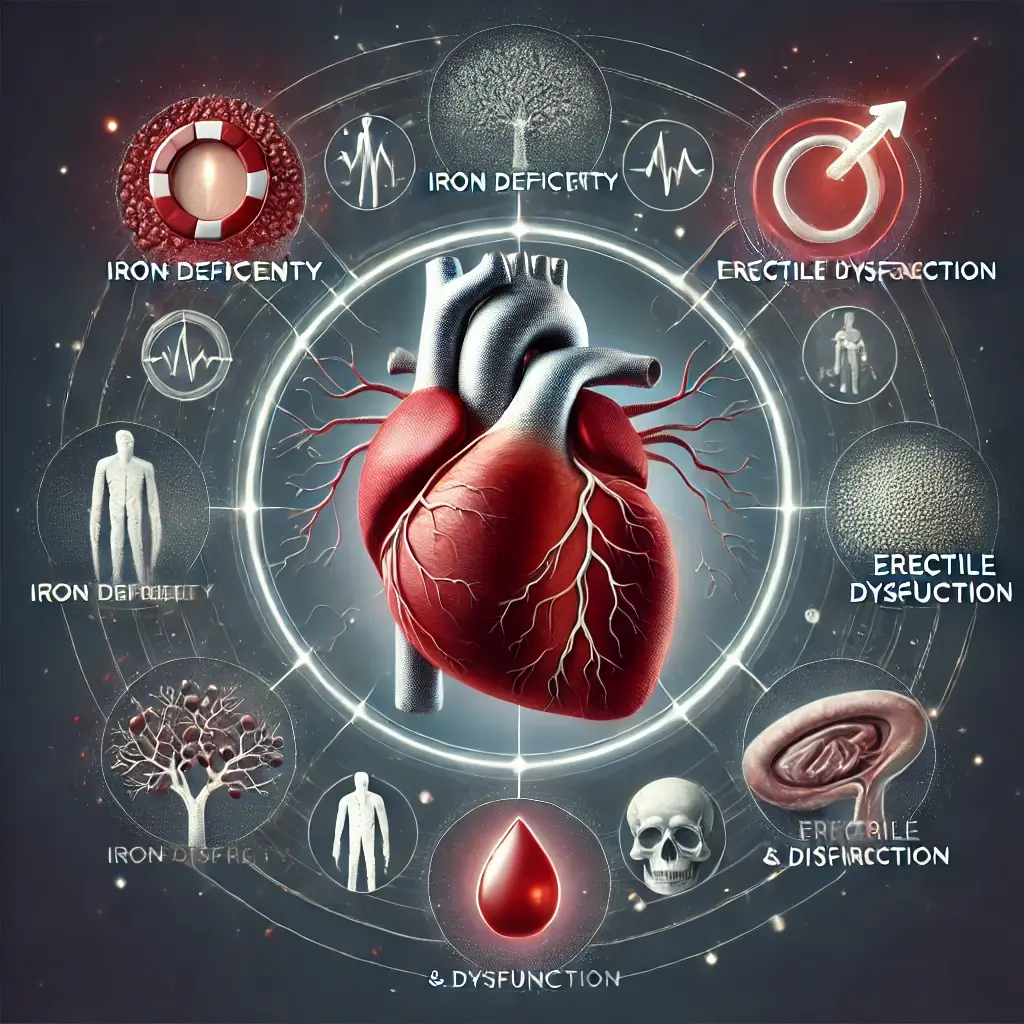Iron Deficiency and Heart Failure
Iron deficiency, erectile dysfunction, and starvation are all factors that increase the risk of heart failure. Iron is crucial in the production of red blood cells, which transport oxygen throughout the body. Cardiac Impact: Insufficient iron levels in the body hinder the production of enough quantities of robust red blood cells, resulting in a medical condition known as anemia. Anemia decreases the oxygen supply to tissues, including the myocardium. This can lead to cardiac debilitation, necessitating increased cardiac effort to ensure optimal blood circulation, hence heightening the susceptibility to heart failure.
Erectile Dysfunction and Vascular Health
Erectile Dysfunction (ED) refers to the inability to achieve or maintain an erection sufficient for sexual intercourse. Vascular Connection: Erectile dysfunction (ED) may be an early warning sign of underlying vascular issues, such as atherosclerosis or endothelial dysfunction. These vascular problems can impact the blood arteries throughout the body rather than being limited to the genital area. When the blood vessels are not functioning optimally, it might hinder blood circulation to different organs, including the heart.
The Link Between ED and Cardiovascular Disease
The association between erectile dysfunction (ED) and cardiovascular disease (CVD) is firmly established. Vascular diseases that contribute to erectile dysfunction (ED) might also impact the coronary arteries, hence elevating the likelihood of heart failure, myocardial infarction, and other cardiovascular events. The reason for this is that the blood veins in the penis and the heart have comparable physiological systems and are influenced by similar risk factors, including hypertension, diabetes, obesity, and smoking.
Early Detection and Treatment of ED
Timely detection of erectile dysfunction (ED) enables healthcare professionals to diagnose and treat the associated vascular issues at an early stage, preventing them from developing into more severe cardiovascular concerns. To mitigate the risk of developing heart disease and enhance cardiovascular health, patients can treat the underlying causes of ED by lifestyle adjustments, pharmaceutical management, or targeted vascular procedures.
Awareness and Communication
Individuals should prioritize their awareness of the potential correlation between erectile dysfunction (ED) and vascular health. They should also communicate any concerns they have with their healthcare professional. Timely diagnosis and proper treatment of erectile dysfunction (ED) might not only enhance sexual function but also potentially hinder or postpone the development of more serious cardiovascular diseases.
Indirect Relationship Between ED and Heart Failure
It is crucial to acknowledge that erectile dysfunction (ED) does not necessarily have a direct causal relationship with heart failure. However, it can indicate vascular health issues that increase the likelihood of both erectile dysfunction (ED) and heart failure.
Undernutrition and Heart Health
Malnutrition, specifically protein insufficiency, can lead to a weakened heart muscle, resulting in reduced blood circulation efficiency. This can potentially contribute to the pathogenesis of heart failure. Chronic illnesses such as diabetes or obesity frequently coincide with malnutrition, and these conditions themselves increase the likelihood of heart failure.
Interrelated Risk Factors
These risk factors are frequently interrelated. Iron deficiency can cause fatigue, making it more difficult to adhere to a nutritious diet and potentially lead to malnutrition. While the presence of any of these risk factors does not guarantee the occurrence of heart failure, it emphasizes the significance of discussing them with a medical professional.
Seeking Medical Consultation
If you experience any of these problems, it is advisable to schedule an appointment with a doctor. Medical professionals can evaluate your specific circumstances, conduct examinations, and provide treatment strategies to target any existing issues and minimize the likelihood of heart failure.
Adopting a Healthy Lifestyle
Adopting a healthy lifestyle involves: Maintaining an optimal weight, consuming a well-balanced diet, engaging in regular physical activity. Effectively managing stress is essential for maintaining a healthy heart.
Additional Resources
For information on heart failure, refer to the American Heart Association’s website. The National Heart, Lung, and Blood Institute provides information on iron-deficiency anemia. It is crucial to diagnose and control risk factors at an early stage to prevent heart failure. Feel free to communicate with your doctor about any apprehensions or worries you may have.
